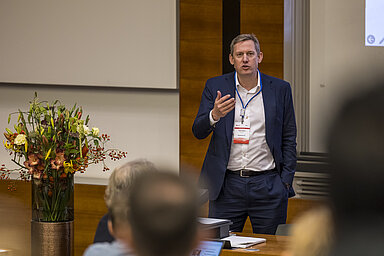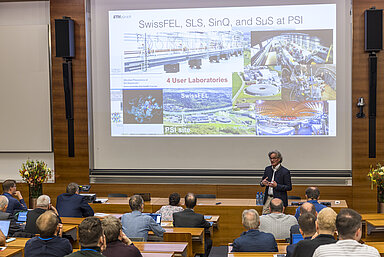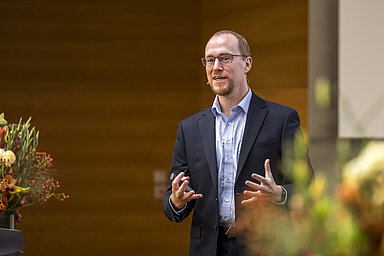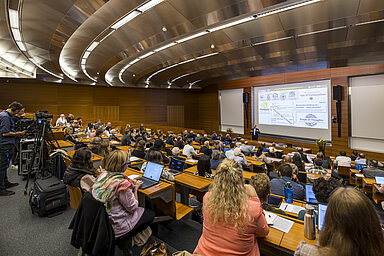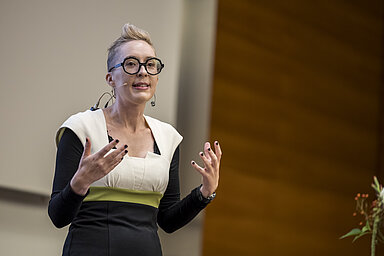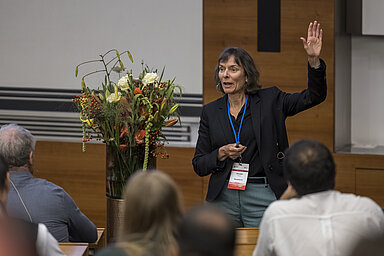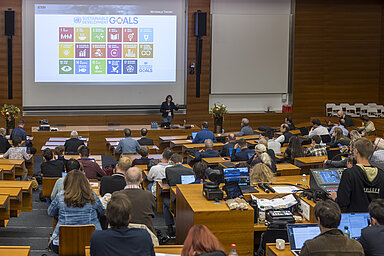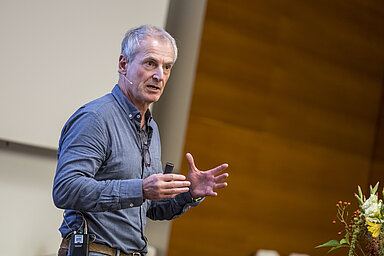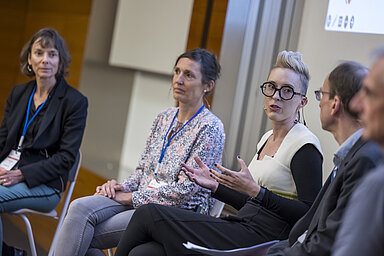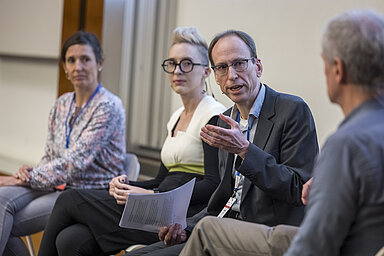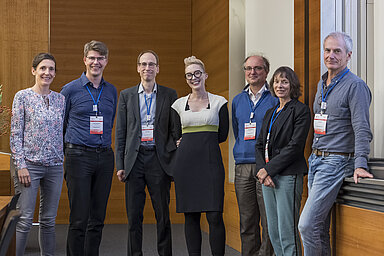October 03, 2024 - by Santina Russo
By now, many are aware that ‘Alps’ represents a significant leap forward in both computational power and in its versatility in addressing the specific needs of various scientific user groups. Designed with an architecture optimized for AI, ‘Alps’ meets the extreme data demands of modern scientific research. It was fitting, therefore, that the inauguration of this new high-end machine kicked off with a scientific symposium.
The event highlighted the recent advances in AI and big data, emphasizing the need for massive computing power to push research boundaries in various fields. Opened by CSCS Deputy Director for Science Joost VandeVondele, the day featured a range of talks, notably introductions to ‘Alps’ from CSCS Director Thomas Schulthess and CSCS AI/ML Chief Architect Torsten Hoefler, as well as scientific presentations by Mary-Anne Hartley, Nicola Spaldin, Tanja Stadler, Jean-Paul Kneib and Peter Bauer.
Improving health care
Mary-Anne Hartley, a visiting professor at EPFL and an assistant professor at the Yale Institute for Global Health, showcased the use of generative AI in healthcare – especially in developing countries where even basic medical care remains limited. In her talk, Hartley emphasized that decision-making in clinical practice can be lifesaving, or, when done poorly, life-threatening. Her research group utilized META’s generative AI model Llama and performed continued pre-training using data from medical research and clinical practice to create a suite of open-source large language models named Meditron. “The models are co-designed by clinicians and adapted for low-resource and humanitarian response,” Hartley pointed out. They can be used just like ChatGPT: Doctors and patients can ask questions and receive assistance with diagnosis and care — an approach that highlights the benefit of AI in improving clinical practice, especially in low-resource regions where medical care is difficult to access.
How to advance civilisation
“What do you associate with civilization?” This was the thought-provoking question posed to the audience with which Professor Nicola Spaldin from ETH Zürich opened her talk. Some of the bolder attendees offered suggestions: law and order, literature, universities, music. Spaldin, however, made the case that civilization is simply a measure of the progress made in material science and engineering. She went on to illustrate this point by tracing human advancement from the Stone Age to the Bronze Age to the Iron Age, each marked by breakthroughs in material science. “Today, we are reaching the end of the Silicon Age, so new materials are essential for advancing society in a sustainable way, limiting energy consumption,” Spaldin said.
In particular, she focused on so-called multiferroic materials and their potential for future data storage. As Spaldin emphasized, the combination of supercomputing and machine learning (ML) capabilities of systems like ‘Alps’ will enable her group to investigate these materials including more accurate physics such as quantum mechanical representations, for example.
Data-driven science: mapping the universe and the spread of pathogens
Jean-Paul Kneib, professor at EPFL and the Swiss Science Delegate at the Square Kilometer Array Observatory (SKAO) Council, echoed the sentiment that the increased computing power enables fundamentally new scientific projects. He introduced the audience to SKAO, a massive radio telescope array that will use radio interferometry techniques with hundreds of antennas to map the universe. One major challenge of this project is managing the enormous amounts of astronomical data that will be collected, an endeavour that will rely heavily on the ‘Alps’ infrastructure.
A completely different type of data was exploited by Tanja Stadler, a professor at ETH Zürich. In her talk, the former head of the Swiss scientific advisory board on COVID-19, which advised the Swiss government during the pandemic, showed how data from genetic sequencing positively exploded due to the research activities driven by the pandemic. The rapid querying features developed in her group enabled real-time tracking of the spread of the various virus variants, and they contributed to fact-based political decisions.
Machine learning: a revolution for science?
The round of scientific talks was completed with Dr Peter Bauer, former director of ECMWF, the European Centre for Medium-Range Weather Forecasts. He discussed how new high-performance computing concepts, combined with ML approaches, will revolutionize weather forecasting in the coming decade.
The event concluded with a lively panel discussion with the speakers chaired by Professor Claus Breisbart, a physicist and philosopher from the University of Bern. Among other things, the panellists debated the opportunities and implications of a powerful infrastructure like ‘Alps’ and explored the role of supercomputing and machine learning in present and future science. Breisbart posed thought-provoking questions about how machine learning is transforming science: “Will correlation supersede causation? Can science advance without unified theories, or even without any mechanistic explanation at all”?
The unified sentiment among the panellists was: likely not. While they think of ML models as revolutionary in their ability to uncover correlations within vast datasets and accelerate the generation of new hypotheses, they agreed this does not replace the scientists’ need to understand. “In material science, ML may help us find promising materials, but we would still need to investigate the properties of the material that make it so useful,” stated Nicola Spaldin. Climate scientist Peter Bauer concurred, adding: “We want to understand the first principles of science always.” “This is what science is, wanting to understand things,” Mary-Anne Hartley emphasized.
Other topics discussed were the transparency of data, the importance of interdisciplinary exchange, or the appeal for young machine learning scientists to work in academia compared to companies.
Watch the full panel discussion on YouTube >
Watch all the talks of the ‘Alps’ Inauguration Scientific Symposium >



